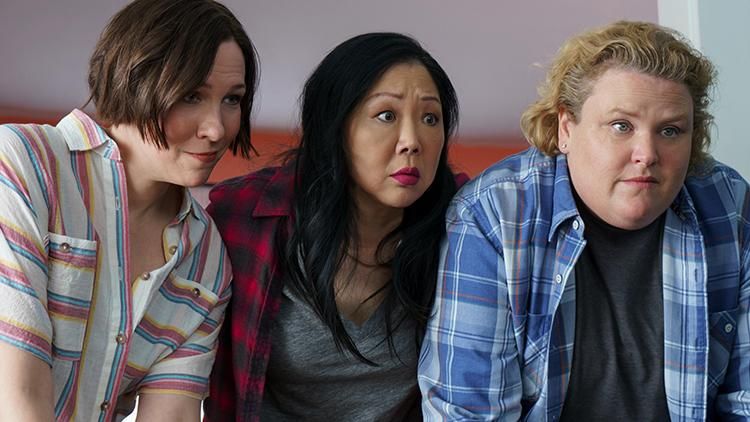Margaret Cho on How ‘Sex Appeal’ Revolutionizes the Teen Sex Comedy
Author: Rachel Shatto

When you think of an ’80s-style teen sex comedy, the phrase “so modern” is probably not the first thing that comes to mind, and yet Sex Appeal, the new Hulu original movie, is very much both of those things — it’s a genuinely funny coming of age story and awesomely progressive.
For one thing, its cast is populated with queer individuals. But it also centers on its female lead’s experience of sexual exploration and pleasure without judgment, but rather in a celebratory way, and it’s hilarious in all the ways that ring so true to real life. It was precisely this alchemy that made comedy legend Margaret Cho want to sign on to play one of the lead’s three moms.
“I just loved the script, I thought it was so funny,” she tells The Advocate, adding how it conjured up memories of when she was a teenager trying to figure out sex. “It’s also just a really fabulous feminist project. It’s very surreal, yet so rooted in truth.”
Sex Appeal follows a young woman named Avery during her senior year of high school — and well on her way to studying at M.I.T. — who finds herself becoming uncharacteristically insecure. The reason: Her long-distance boyfriend says he’s ready for them to take things to the next level and lose their combined virginity. Avery sets out to solve her little problem the only way she knows how: through scientific experimentation with her best friend, Larson. Shenanigans and sexual explorations ensue.
While the setup for the film might sound fairly traditional for the genre, it’s the execution that makes it feel so fresh and revolutionary (and funny, very funny). In particular, Cho says she appreciates how much Sex Appeal differs from the mold of similar films in the past.
“There was this run of male-focused ’80s fantasy, losing your virginity, movies like Weird Science. They always had like an Anthony Michael Hall… like lusting over Kelly LeBrock. And [Sex Appeal] is very similar film in tone. But this is from a female perspective.”
And it’s not just a female perspective that makes Sex Appeal’s approach feel so fresh; there’s also its sex positivity. Cho’s character is a famed artist known for her extraordinary, labia-inspired artwork and Avery’s journey reflects having been raised in a home where sexuality was seen as healthy and shame-free. Similarly, the movie avoids the pitfalls of moralizing or slut-shaming its lead about her sexuality and desire, while also centering her pleasure.
“That’s something that’s been continually ignored in film,” notes Cho. “It’s a missed opportunity. Because female pleasure is so cinematic … we just very rarely get to approach eroticism, not only from a female point of view but also from one that diverges from the male gaze, one that diverges from even this idea of the body as being sort of a voyeuristic thing.”
Sex Appeal’s approach to depicting sexuality is proof of Cho’s point because it certainly is cinematic. The film eschews standard sex scenes for charmingly surreal vignettes that highlight the sensual experience, and in doing so manages to find a more accurate — if less literal — truth about early sexual experiences.
“Why do we always feel like we’ve got to sort of just watch this like kind of humping?” asks Cho. “When really, it’s so much more encompassing than that. There’s so much more that sexuality involves than what’s been captured in film and in television. And so I appreciated the scope of it that this film offers.”
No question a big part of what makes this movie work so well is that it’s helmed by out filmmaker Talia Osteen, who brings her worldview and life experience to the project, explains Cho. “It’s understanding it from a female point of view from a feminist point of view, from a queer point of view, and also from a mom,” she says.
Supporting Avery along the way — to hilarious effect — are her two mothers, played by Fortune Feimster and Cho, as well as Cho’s character’s new partner played by Rebecca Henderson. It’s a loving, messy, and familiar kind of family for queer folks who’ve found their chosen families, something that wasn’t missed by Cho when she read the script. “It’s very realistic to me … this kind of very cohesive group parenting, which I think is really beautiful,” says Cho. “That’s a really important part of the story. It’s probably one of the reasons why [Avery] is so welcoming to new ideas and new ways of thinking.”
It’s also another example of how the film industry is taking steps in the right direction when it comes to representing the fullness and complexity of queer families. And the industry is changing, says Cho.
“Opportunities are shifting and growing for women; for women of color, for the BIPOC community, for the trans community — for anybody that’s not on the gender binary,” she explains. “We’re expanding our notions of gender, of queerness, of race, of all of these things.”
She adds, however, that things still have a long way to go. “It’s just starting. I don’t think it’s there yet, of course. But I do admire this shift in society to look at ‘other’ as a voice, like, ‘oh, we actually count as a voice.’ This is a new element of life to me. And so I’m really grateful for it,” says Cho.
And it’s films like Sex Appeal that take the familiar and tweak it to be more inclusive and representative that are helping to pave the way — and also making us laugh. A lot.
Sex Appeal premieres today on Hulu. Watch the trailer below.
Original Article on The Advocate
Author: Rachel Shatto



